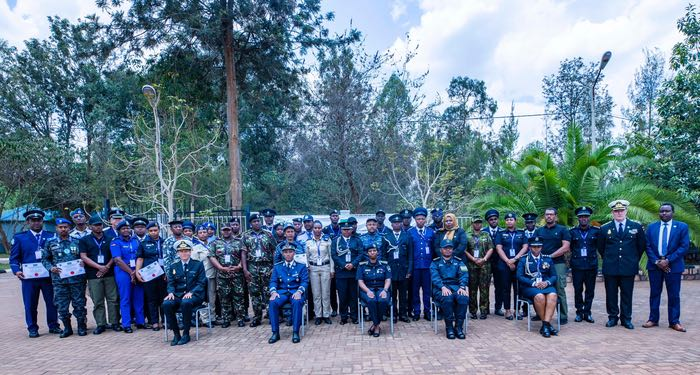
Thirty-three law enforcement officers from eight African countries completed a two-week African Union Police Officers’ Course (AUPOC) at the Police Training School (PTS) Gishari in Rwamagana District.
Participants came from Comoros, Djibouti, Ethiopia, Kenya, Seychelles, Sudan, Uganda and Rwanda.
The operational readiness course was conducted by Rwanda National Police (RNP) in partnership with the Eastern Africa Standby Force (EASF) to address continental security challenges.
It was designed to contribute to the EASF and continental multidimensional operational capabilities in AU peace support operations.
The Deputy Inspector General of Police (DIGP) in Charge of Administration and Personnel, DCG Jeanne Chantal Ujeneza, pointed out that unity and capacity building are the keys to breaking Africa’s conflict cycle.
She added that Africa has declared its path forward in the African Union’s Agenda 2063—an agenda that envisions a peaceful and prosperous continent.
The Constitutive Act of the African Union further underscores the importance of regional cooperation to address security challenges, and DIGP Ujeneza added that law enforcement institutions should strive to live up to these goals and values.
“Regional peace and security depend on both political will and joint efforts, such as this course. No single nation, regardless of its strength, can tackle these challenges alone. The importance of joint training cannot be overstated—it is only through collaboration that we can find solutions that transcend borders,” DIGP Ujeneza said.
She said that Rwanda and EASF partnership recognizes critical issues that avoids the past mistakes, where individualism and inaction allowed conflicts to fester.
“Rwanda National Police prioritizes training and capacity-building as part of our strategic objectives. By developing these skills, our officers are better equipped to perform their duties both domestically and in international missions, including UN peacekeeping operations and bilateral cooperation, such as in Mozambique,” she said.
This training, she said, represents a tangible step towards ensuring peace and stability across Africa.
Commissioner Ali Said Bacar, the Head of Police component at EASF, said that the credibility of the police capabilities of member states should be able to effectively meet the demands of policing in contemporary Peace Support Operations.
“As part of its mandate, the EAS Police Component has continued to carry out capacity building by identifying and training qualified Personnel in preparation for deployment in peace support operations, where they would be required to undertake critical roles which include supporting the re-establishment of law and order; providing operational support to host-state police; protecting civilians, and UN staff and facilities; and assisting with capacity-building, training, and the reform,” said.
Commissioner of Police CP Robert Niyonshuti, the Commandant of PTS, said that over the past two weeks, participants engaged in both theoretical lessons and practical exercises, including Field Training Exercises (FTX).
These sessions, CP Niyonshuti said, were designed to simulate real-world scenarios that the trainees may encounter in the field. (End)
